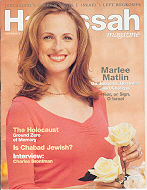 A story in the November issue of Hadassah Magazine spotlighted issues that parents of Deaf children face if they wish their children to receive a Jewish education. Four of Khana Globman’s nine children are deaf. Mordekhai, the eldest, has the most residual hearing and best speech, so from the age of 12, he attended the Orthodox day school near his home in Philadelphia. Hearing aids and an auditory trainer that amplified the teacher’s voice and blocked background noise were enough to mainstream him. Avrummy and Aron, the twins, and Yossi, the youngest, needed English and Hebrew interpreters in the classroom-provided mostly at the Globmans’ own cost and supplemented by fund-raisers they organized. The English interpreter wasn’t hard to come by, but finding someone adept in Jewish concepts as well as American Sign Language was a different story.
A story in the November issue of Hadassah Magazine spotlighted issues that parents of Deaf children face if they wish their children to receive a Jewish education. Four of Khana Globman’s nine children are deaf. Mordekhai, the eldest, has the most residual hearing and best speech, so from the age of 12, he attended the Orthodox day school near his home in Philadelphia. Hearing aids and an auditory trainer that amplified the teacher’s voice and blocked background noise were enough to mainstream him. Avrummy and Aron, the twins, and Yossi, the youngest, needed English and Hebrew interpreters in the classroom-provided mostly at the Globmans’ own cost and supplemented by fund-raisers they organized. The English interpreter wasn’t hard to come by, but finding someone adept in Jewish concepts as well as American Sign Language was a different story.
Globman herself spent years interpreting by her sons’ sides in the yeshiva. “The Jewish community has grown tremendously in terms of accepting kids with learning disabilities, even mental retardation, but deafness is a disability that is invisible,” Glubriiail says. “People don’t see that you’re deaf, but it’s tremendously isolating.”
Parents of deaf children often bear the cost-physically, emotionally and financially-of educating their children Jewishly. Though many synagogues and schools are open to providing interpreters, they rarely do so automatically or at their own cost. “Doesn’t anyone recognize that these kids should be included?” asks Globman. To fill in the numerous gaps in awareness and sensitivity to those who are deaf and Jewish, parents have founded educational programs and outreach organizations.
Aaron Margolis-Greenberg, now 14, was initially rejected by the day school in Indianapolis until a major donor with a partially deaf grandson found out, says his mother, Cassia Margolis. On the phone, it’s almost impossible to detect any impediment in Aaron’s speech. Still, “the school insisted he needed an interpreter,” Margolis recalls. “I went to the classroom and helped the teacher in other ways.” Many hearing parents want their children mainstreamed, she says, but not every child succeeds. “People think speech is a measure of intelligence. It’s not,” says Margolis. “Parents have to come to terms with the fact that their child is not a failure.” Her 8 year-old daughter, Sarah, does not speak well and attends the Indiana School for the Deaf, where eight of 300 children are Jewish.
Christian groups offer after-school Bible classes and activities, but no Jewish groups present similar programs. Margolis decided to create her own resources: she developed a series of eight ASL videotapes, called “Jewish Heritage and Holidays,” available free of charge to the Jewish Deaf. “I intended them for children, but threequarters go to adults who say they never understood the Seder, never said Kaddish.” The most important thing for Jewish identity, she says, is the family, heightened by the need for appropriate communication. “If the child doesn’t speak well, the parents have to learn to sign, otherwise they will not be able to convey values,” she says. “For those who have access to the hearing world, it’s difficult but doable to access Judaism; for those who don’t, it’s almost impossible.”
For a longer version of this story, see www.hadassah.org and link to the November, 2002 issue.





